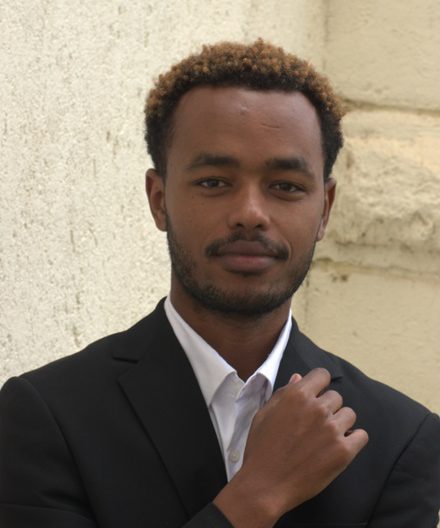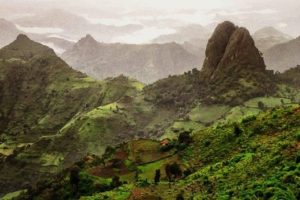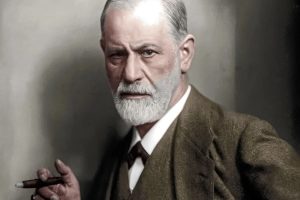
Art is one of the ways in which a country promotes itself internationally; a movie is one. For a country like Ethiopia that has many languages, cultures, and histories, if the sector gains attention, it will contribute to the country’s economy.
Habtamu Mekonen was born and grown up in the small town of Ebanat, located in the city of Gondar, 120 kilometers from Bahir Dar and 700 kilometers from Addis Ababa. Apart from his mother, he spent his childhood traveling to different places because his elder sister was a teacher.
He lost his father when he was 10 years old. Dealing with this at a young age left him with severe psychological scars. He also says that not getting a father’s love as a child is not something to be taken lightly. His father was the family’s source of income, so his father’s death affected not only him but also the family’s economy. “Because I lost my father when I was young, it took me time to look for another role model in my life.” He reminds us that apart from the value of fatherhood, a father also shows the way of life to his children. But in this, he says that he was raised by a strong and brave mother.
Habtamu and art met when he was a primary school student when a group of amateur theater clubs came to his school to perform plays. He was participating in various plays at school. However, he did not have the information that both theater and film careers are scientifically designed and taught at the university. When he was a high school student, he joined the Mini Media Club, which is said to be the birthplace of many artists and journalists, and started presenting news for various entertainment programs.
Through his school friend, he got the information that theater classes are offered at Addis Ababa University. This information opened his eyes. When he finished his 12th grade, he chose to study at Addis Ababa University. His family did not oppose the election. He remembers that it was during his stay at the university that he got to know many of Ethiopia’s filmmakers. He was able to get his first knowledge about film in this department of Addis Ababa University.
Professor Haile Gerima is one of the first filmmakers he met, and since the professor is originally from Gondar, he was able to instill in him the mentality that someone from a small town outside of Addis Ababa can contribute to the profession in this way. Previous filmmakers such as Dawit Tasewe and Abebe Kesila are professionals whom Habtamu takes as examples, and Professor Teshome Hailegabriel is the starting point for him to continue in film education.
When Habtamu was at university, most of his attention was on his studies. Together with other students, he actively participates in the projects given by the teachers. However, Habtamu wants to learn and know more about movies. The class he was studying was focused on theater, so he does various studies to help him learn about film and teaches himself about the film industry.
Habtamu says that during his time at university, he had good communication and cooperation with his friends, so using these methods to increase his knowledge has greatly benefited him to attain the level he has reached now. He doesn’t believe that the information and educational opportunities he got are enough because of his passion to enter the profession. He does experiments on the knowledge he has acquired and tries to improve himself by taking lessons available on the Internet. In 2010, he graduated with the highest honors when he completed his studies in theater and literature. This has a different meaning for him.
Habtamu first tried his hand at the film industry when he was a student in the movie “Tefetari,” in which he participated as a production manager. Another time, when a production company from America was making a documentary in Addis Ababa, Habtamu got the opportunity to work as an assistant director. Through his experience in the film, he realized that he has to work hard to create as much influence as he imagines and to become a competitive professional at the international level.
When he graduated from the university with the highest rank, the first thing he asked himself was whether he is qualified to film and share history in the way he wanted. Although he wanted to stay in the film industry for the rest of his life and make an impact, he did not choose to enter the industry with insufficient knowledge and skills, so the option he presented to himself was to empower himself with better knowledge.
After graduation, Habtamu seems to have followed the example of his elder sister. He started his career as an assistant teacher at Debre Markos University. He found that place to be a source of joy, as teaching is about sharing what we know with others. When he taught at Debre Markos University as an assistant teacher for two years and eight months, he explained that it was a time when he not only taught students but also developing a niche for himself.
Habtamu joined the teaching profession shortly after graduating from the university, he says that being a young teacher is not easy, especially in higher education institutions. “Not only to my students, but also to the community working at the university, I don’t seem like a teacher. But being young has given me the opportunity to improve the relationship between me and my students and to consult my students’ ideas outside of school,” he says.
He says that in the age of technology, knowledge is always renewed, so a teacher should constantly improve himself and do various studies to give students the knowledge they deserve.
Explaining about his experiences as a teacher, “When I entered the classroom I was assigned to teach on the first day, students were standing at the door of the classroom waiting for the teacher. They didn’t notice me because they thought I’m studying with them, and I had to say that I am your teacher.” He remembers.
Habtamu has reached his current position by trying different opportunities. The message he conveys to his peers is, “When we are young, our biggest potential is that we have the time and ability to educate ourselves, unlike others. Time is the most precious gift in the world, and young people can be exemplary in their careers by educating themselves on what they love. There is no shortcut. If it is necessary to study and work hard, then life will be easier, I think. ” He shares his thoughts.
What sets Habtamu apart is his belief in knowledge. He always tries to qualify himself by saying that there is no knowledge that is said to be enough. After teaching at Debre Markos University for more than two years, he came to Addis Ababa University to study for his second degree in film. Habtamu says that during his stay at the university, he did not get the amount of technical knowledge he wanted. While trying other options, he was able to participate in two big international forums. One is a multi-choice talent factory that selects 60 students from Africa and provides free education opportunities in East Africa, South Africa, and West Africa.
He temporarily postponed his master’s degree and made the trip to Kenya. The training opportunity provided by the company is for one year and is fully on-the-job training. He is currently taking his training in Kenya.
He also says that the film industry in Kenya and the country’s film relations with other countries are better, which helped him find other opportunities. Through this opportunity, he started working on his first film, in which he participated as a writer and director.
Habtamu said that film schools in Ethiopia are not worthy of a country with a rich history and culture like Ethiopia. He says that private training institutes operate better than government-level educational institutes.
Habtamu knows that it is important to know not only about the technical knowledge of film but also about the business in the film industry. As a film reflects the culture and tradition of a country’s history, he has the idea that this story should be known and sold at the world level and leave its mark on the country’s economy. He recalled that the African Union’s 2063 agenda to increase the economy of creative and cultural heritage and make it contribute to the country’s GDP was mentioned in the plan. Ethiopia should take the experience of these countries so that the coffee and flower sector can support the economy as we are known in the world.
The second event that Habtamu attended was the Durban Film Mart, the largest annual African film market and film festival held in Durban, which allowed him to have a better knowledge of the business of the film industry. (Durban Film Mart) aims to increase the development and production of African cinema, how to run a film effectively in the business world, and the general aspects of the film business for participants to gain experience. This year, more than 200 people competed, and 30 participants were selected to participate at the exhibition. Habtamu was the only Ethiopian participating in the festival this year. (To be continued)
MEKLIT WONDEWOSSEN
The Ethiopian Herald November 9/2023





